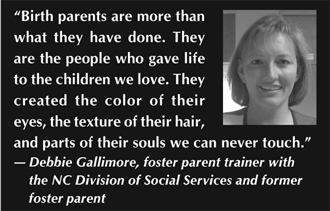Vol. 10, No. 2 • May 2006
Parntering with Birth Families of Children Who Have Been Sexually Abused
Child sexual abuse stirs up strong responses in all of us. When a child has been sexually abused we may experience a variety of emotions, including fear, helplessness, and sympathy.
Often, we also feel anger. Anger toward the abusing parent or family member, for what he or she has done. Anger at the nonoffending parent, for failing to prevent the abuse or for failing to acknowledge that the abuse has occurred. This anger is natural and we should not blame ourselves for feeling it.
Yet anger towards the birth parents can also prevent foster and adoptive parents from being supportive of connections between the child and the birth family.
This can have a devastating impact on children. Regardless of what their parents have done, children have a compelling need to be connected to their families of origin. Without this link, children often continue to have many unanswered questions and unresolved feelings that can make it difficult to develop their own healthy, independent identities.
Judgments can also be a problem. Kids usually know it when their foster or adoptive parents judge their birth parents. The divided loyalties and sense of personal injury or attack that children often feel when their parents are condemned can make it difficult for them to be “OK” in foster care, which can impact their behavior in the home and at school. Over time, conflict between the different parents in their lives may even damage children’s ability to attach to adoptive parents, foster parents, and others.
Positive connections between foster and birth parents mean a lot to kids. As veteran foster parent and foster parent trainer Debbie Gallimore explains it, “What I didn’t realize for many years is that the more I accepted and honored the birth families of my foster children, the more the children connected with and loved me. It seemed such a paradox. Yet I came to realize that by honoring and loving their families, I was honoring and loving them, too.”

When there is partnership between birth and foster parents, foster parents are in a better position to help meet children’s deep needs for connection, which promotes their healthy emotional development. Through partnerships with birth parents, foster parents can also help birth parents learn new ways to support and nurture the child. For example, foster parents can model parenting skills that ensure the safety of children who have been sexually abused.
Of course, as long as you care about children, you will react emotionally when they are hurt. Fortunately, there are things you can do to manage your emotions before you have contact with birth parents. Some of these include:
- Talk with your licensing worker or the child’s social worker before meeting with the birth parents.
- Make a list of the birth parents’ strengths; this will help you remember that they are more than what they have done to their children.
- Remind yourself how birth family connections benefit children, especially the development of their identities.
- Have a plan for what to do if your own emotions about the birth parents begin to interfere with your efforts to develop a partnership (e.g., you might count to 10, or simply take a break).
If you are a North Carolina foster parent and would like to learn more about partnering with the parents of children who have been sexually abused, contact your licensing social worker. The NC Division of Social Services regularly teaches MAPP-GPS trainers to teach foster and adoptive parents about this topic.
Copyright � 2006 Jordan Institute for Families
